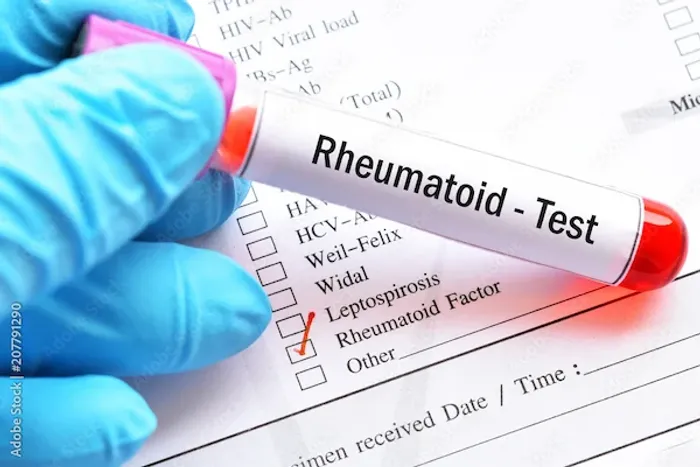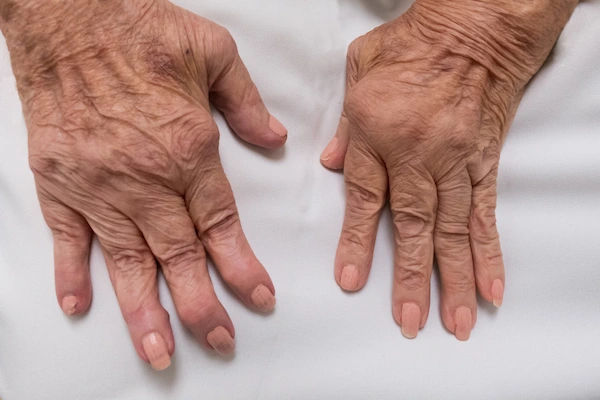Understanding the Rheumatoid Factor Test
Learn about the Rheumatoid Factor (RF) Test, its purpose, procedure, and what the results mean. Understand how it helps in diagnosing rheumatoid arthritis and related conditions.

Written by Dr. Rohinipriyanka Pondugula
Reviewed by Dr. Md Yusuf Shareef MBBS
Last updated on 13th Jan, 2026

Introduction
If you or someone you know has been experiencing joint pain, stiffness, or swelling, your doctor may have recommended a Rheumatoid Factor (RF) Test. This simple blood test helps detect a protein called rheumatoid factor, which is often associated with autoimmune diseases like rheumatoid arthritis (RA).
In this article, we’ll break down what the RF test is, why it’s done, what the results mean, and how you can manage your health if you have high RF levels.
What is the Rheumatoid Factor (RF) Test?
The Rheumatoid Factor (RF) Test is a blood test that checks for the presence of rheumatoid factor, an antibody produced by the immune system. Normally, antibodies fight infections, but sometimes, they mistakenly attack healthy tissues, especially joints, leading to inflammation and pain.
This test is often used to help diagnose rheumatoid arthritis (RA), an autoimmune disease that causes chronic joint inflammation. However, RF can also be present in other conditions, so doctors usually consider other tests and symptoms before making a diagnosis.
Consult a Rheumatologist for the best advice
Why is the RF Test Done?
Your doctor may recommend an RF test if you have symptoms like:
Joint pain, swelling, or stiffness (especially in the morning)
Fatigue and weakness
Warmth or redness around joints
Numbness or tingling in hands/feet (in advanced cases)
The test helps:
Confirm or rule out rheumatoid arthritis (RA)
Differentiate RA from other types of arthritis (like osteoarthritis)
Monitor disease progression in diagnosed patients
Understanding Your RF Test Results
Interpreting the results of your Rheumatoid Factor (RF) test is important for understanding your health. Here’s what they may indicate:
Normal RF Levels
Negative RF (0-14 IU/mL): No significant levels detected.
Low Positive (15-50 IU/mL): May indicate early RA or another condition.
High Positive (>50 IU/mL): Strongly suggests RA or another autoimmune disorder.
What Does a Positive RF Test Mean?
A positive RF test doesn’t always mean you have RA. Some people without RA (especially older adults) may have slightly elevated RF due to other conditions, such as:
Lupus
Sjögren’s syndrome
Chronic infections (hepatitis, tuberculosis)
Liver or lung diseases
On the other hand, some RA patients test negative for RF but still have the disease (called seronegative RA). That’s why doctors use additional tests (like anti-CCP antibody test) and physical exams for a complete diagnosis.
What If Your RF Test is High?
If your RF levels are high, don’t panic; your doctor will consider your symptoms, medical history, and other tests before confirming a diagnosis.
Next Steps:
Consult a Rheumatologist (a specialist in joint and autoimmune diseases).
Additional Tests: Anti-CCP, ESR (erythrocyte sedimentation rate), CRP (C-reactive protein), and imaging tests (X-rays, ultrasounds).
Early Treatment: If diagnosed with RA, early treatment can prevent joint damage.
Get Your Health Assessed
Managing Rheumatoid Arthritis (RA) and High RF Levels
While there’s no cure for RA, proper treatment and lifestyle changes can help manage symptoms and slow disease progression.
Medical Treatments
Disease-Modifying Antirheumatic Drugs (DMARDs): Methotrexate, hydroxychloroquine.
Biologic Agents: TNF inhibitors (like adalimumab, etanercept).
Pain Relievers: NSAIDs (ibuprofen) or corticosteroids for flare-ups.
Lifestyle & Home Remedies
Regular Exercise: Low-impact activities (swimming, yoga) keep joints flexible.
Balanced Diet: Anti-inflammatory foods (fish, nuts, leafy greens).
Weight Management: Reduces stress on joints.
Stress Management: Meditation and relaxation techniques help.
Adequate Rest: Prevents fatigue and joint strain.
When to See a Doctor?
If you experience:
Persistent joint pain and stiffness (especially in the morning)
Swelling, redness, or warmth in joints
Unexplained fatigue and weakness
Don’t ignore these signs! Early diagnosis and treatment can make a big difference in managing RA.
Final Thoughts
The Rheumatoid Factor Test is a helpful tool in diagnosing RA and other autoimmune conditions. However, it’s just one piece of the puzzle; your symptoms and other tests matter too.
If you have joint pain or high RF levels, consult a rheumatologist for a proper evaluation. With the right treatment and lifestyle changes, you can manage RA effectively and maintain a good quality of life.
Consult a Rheumatologist for the best advice
Consult a Rheumatologist for the best advice

Dr. Anand Ravi
General Physician
2 Years • MBBS
Bengaluru
PRESTIGE SHANTHINIKETAN - SOCIETY CLINIC, Bengaluru

Dr. Zulkarnain
General Physician
2 Years • MBBS, PGDM, FFM
Bengaluru
PRESTIGE SHANTHINIKETAN - SOCIETY CLINIC, Bengaluru

Dr. Sundeep Kumar Upadhyaya
Rheumatologist
30 Years • MBBS, MD, DM
Noida
Apollo Hospitals Sector 26, Noida
(25+ Patients)

Dr. Brig K Shanmuganandan
Rheumatologist
27 Years • MBBS, MD (Med.), DNB (Med.), Fellow (Rheuma.)
Chennai
Apollo Hospitals Greams Road, Chennai
(475+ Patients)

Dr. Gautam Dhar Choudhury
Rheumatologist
18 Years • MBBS MD (Internal Medicine) Fellowship in Rheumatology ( SGPGI Lucknow) FICP
Kolkata
Apollo Multispeciality Hospitals , Kolkata, Kolkata
(100+ Patients)




